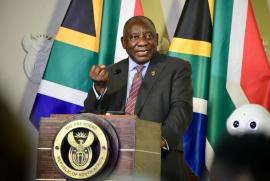
President Cyril Ramaphosa has called on government departments, policy makers, researchers, civil society organisations and international organisations to use the information from Census 2022 to collectively strive to improve people’s lives.
“Census 2022 has told us where we are making progress, but it has also laid bare the challenges that remain. It will be an invaluable tool in meeting those challenges. We now have the information we need to ensure that as we build this country, we leave no one behind,” the President said
He made these remarks during the hand over of the Census 2022 national results by Statistician-General Risenga Maluleke at the Union Buildings in Pretoria on Tuesday.
The population and housing census was conducted in February 2022 and provides comprehensive data on population size, demographic trends, and other service delivery related information.
According to the results, South Africa’s population has increased from 51.7 million in 2011 to more than 62 million in 2022, which is a growth rate of 1.8% in the intercensal period.
“The data contained in a census is one of the most crucial planning, monitoring and evaluation tools for governments. It informs the planning, budgeting and policymaking work of government at the most fundamental level.
“We have long said that one of our priorities in building a capable, ethical, developmental state is to ensure that policy making is evidence driven. Policy making that is not informed by accurate data can result in inefficiency in the allocation of resources, under-estimation of the needs of citizens, poorly planned programmes and poor financial management. Unless we are able to see the bigger picture, we are unable to forecast,” the President said.
He said Census 2022 gives South Africa the information it need to implement government’s programme of action in a targeted, evidence-driven manner.
“We encouraged by the progress in the report presented by the Statistician-General. We note, for example, that the number of people older than 20 with no education has significantly decreased, where the number of people who now have grade 12 has more than doubled since 1996.
“It is significant also that a large proportion of our children are now in early childhood development centres. We still have work to do to ensure all eligible children attend ECD centres. The presentation shows that people’s housing circumstances have improved, with almost 90 percent of South Africans now staying in formal housing,” the President said.
President Ramaphosa said despite the present challenges of load shedding, South Africans should be encouraged by the almost universal access to electricity supply.
“The results that have been presented here today underscore the urgency with which we must work towards meeting the aspirations of the National Development Plan and the United Nations Sustainable Development Goals,” he said.
The President said this is the fourth census undertaken since the advent of democracy in 1994, and, as such, it contributes to a vast body of knowledge that describes the state and the progress of the nation.
Census 2022 was the fourth population and housing count in post-apartheid South Africa, with the first conducted in 1996, with subsequent censuses being conducted in 2001 and 2011.
This is South Africa’s first-ever digital census, compiled from data collected from everyone within the borders of the country. – SAnews.gov.za


